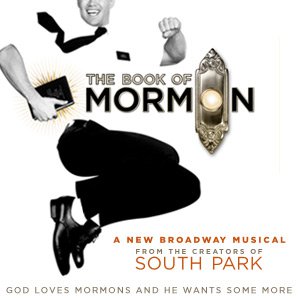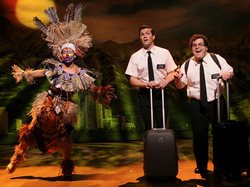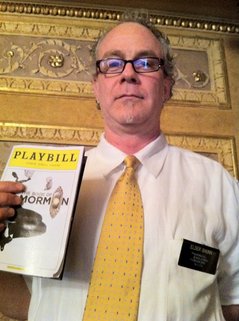It used to be that when people would find out I'm a former Mormon, they'd ask me whether or not I watch Big Love and how closely it matches my experience of growing up in Utah. (Answers: "Yes" and "Not much.") Over the past year, though, that has changed. Now they ask whether or not I've seen The Book of Mormon.
The answer to that is yes. In fact, as soon as the Broadway production was announced, Laura and I started making plans to visit New York and see it. With my background, how could we not? We put together a group of friends that included my agent and got tickets for April 9th, about two weeks after the show's official opening. I bought our tickets early enough that it wasn't hard to get seats for a group of eight on our preferred date. But by the time we actually saw it, the hype had revved up to such a wild extent that people were asking us how on earth we'd managed to score tickets.
The Book of Mormon—from South Park creators Trey Parker and Matt Stone and Avenue Q co-creator Robert Lopez—was the most celebrated new musical of the 2011 Broadway season, and it's easy to see why.

Is it really that good? I don't think so. Did I enjoy it? Yes, to an extent. Was it funny? Yes, to an extent. Was it anything like my experience as a missionary? Yes—but to a very small, almost irrelevant extent.
The Book of Mormon tells the story of Kevin Price (Andrew Rannells), a Mormon youth who dreams of serving as a missionary in Orlando, Florida. Instead, he gets assigned to Uganda with Arnold Cunningham (an irrepressible Josh Gad) as his companion. Elder Cunningham is just about the biggest screw-up ever to pass through the Missionary Training Center, and Elder Price tries to put the best face on both disappointing assignments.
But Uganda turns out to be even more hellish than he could have imagined. The more experienced, longer-serving missionaries have not managed to convert a single soul in that war-ravaged land. Poverty and famine reign supreme. AIDS is rampant, its spread only exacerbated by the belief that it can be cured by having sex with a virgin (which spawns a surfeit of baby-rape jokes). A local warlord rules with a bloody iron fist. And the villagers get through their days by cursing God in no uncertain terms from behind philosophical grins.
Elder Price, depressed, does his best to preach the gospel according to Joseph Smith, but throws in the towel after the warlord, General Butt-Fucking Naked (Brian Tyree Henry), murders a man in front of him. It falls to Elder Cunningham to take over the proselytizing effort. But the well-meaning Cunningham, who didn't pay very close attention in class at the MTC, has never actually read the Book of Mormon, which forces him to invent gospel stories more tailored to the realities of life in Uganda.
The Book of Mormon is, above all else, funny—side-splittingly funny through a couple of long stretches. Okay, I'll say it. I think my first viewing of the South Park movie in a crowded theater was the last time I laughed as hard as I did right up through the show-stopping musical number "Hasa Diga Eebowai," an incredibly profane and blasphemous riff on sunny, reductive ditties like The Lion King's "Hakuna Matata." (On the off-chance you've been living in a cloister for the past twelve months and don't know the translation of "hasa diga eebowai," I won't spoil it for you.)
The songs are mostly terrific too, certainly up to the standards of the past twenty years of Broadway musicals. The production numbers are tuneful and funny, and there are even good laughs to had in the quieter numbers.

But the show suffers in other ways. From a dramatic standpoint, the story's through-line is fractured by the disappearance of Elder Price, the nominal protagonist, through large portions of the second act. (I know that Price's character is meant to skewer the trope of the Broadway hero whose naive confidence enables him to conquer the world, but that doesn't mean it works.) Characters behave in inconsistent ways that undermine the plot—the murderous General Butt-Fucking Naked, for example, who early on is unafraid to shoot an innocent villager in the head or to sodomize a missionary with a holy book, but in the end is cowed by inspirational stories. The violence itself plays more like a blatant attempt to shock than an organic element of the plot, as if a page from a Quentin Tarantino script had been pasted by accident into the book, and introduces an unwelcome tone of reality that sits at odds with the relative sweetness of the rest of the production.
All that is forgivable, but the worst sin The Book of Mormon commits is to grow boring through much of its middle. Somewhere on the way to the muddle that takes Elder Price out of the spotlight, the show just stops being clever. It never exactly stops being funny in a low-level way, but neither the plot nor the jokes rises above a certain bland level of predictability. Oh, so one of the older missionaries is a repressed homosexual? Yawn. So the naive young Nabulungi (Nikki M. James) imagines Salt Lake City as a magical wonderland where the warlords are kind and there's a Red Cross on every corner? Ho hum.
The show catches fire again toward the end, after the miraculous conversion of nearly the entire village catches the attention of the Mormon mission president, who comes to congratulate the local missionaries and is treated to a hilarious production number in which the villagers rehash all the mixed-up misconceptions Elder Cunningham has taught them about the Book of Mormon. Some of this material verges on the racist, but The Book of Mormon is ultimately saved, if not redeemed, by the villagers' innate understanding that they are not being taught literal truth but rather a series of parables intended to help them process and deal with the harsh realities of their daily existence.
This final message about religion's palliative effects in a grim world did enable me to leave the theater with a smile on my face, but I still can't shake my conviction that The Book of Mormon is hardly the flawless gem so many people seem to think it is. Still, I can't deny that I had a lot of fun watching it, and the funny parts are so funny that most theatergoers will probably forgive the parts that drag.
All right, so that's my review of the production itself. But how accurately does it reflect the realities of Mormonism, and of the lives of Mormon missionaries? Well ... not all that well.
Don't get me wrong. Trey Parker and Matt Stone have done their research, at least into Mormon history and doctrine, as two rather funny numbers ("All American Prophet" and "I Believe") amply demonstrate. They've come a long way from the days of Orgazmo, their 1998 film about a Mormon missionary who becomes an accidental porn star, which was wall-to-wall stupid-funny but didn't have the glimmerings of a first clue about Mormon teachings or missionary life.
They had a much better handle on things Mormon by the time they made the infamous "All About Mormons" episode of South Park in 2003, which I gave high marks for the accuracy of its portrayal of the way the church presents its own history.

One of the things they get right, which matched my experience to a scary degree, is the crushing sense being exiled to a strange land for a period of time that seems so long it may as well be forever. They also nail the feeling of despair that comes from being saddled with a companion not of your choosing who doesn't share your same work ethic.
But the mechanics of missionary life they get mostly wrong. "Two by Two," for instance, the song in which the young elders at the Missionary Training Center get their assignments, makes for a fun production number, but is based on fantasy. In reality, missionaries learn where in the world they'll be sent months before they report to the MTC. They also are not normally assigned to be companions with other greenies, and certainly aren't assigned to just one companion for the full duration of their missions. New missionaries get more experienced elders as their first companions in the field, and their companions rotate every two or three months. (I had over a dozen different companions myself over the course of my mission.) And no missionary would ever be allowed to leave the MTC with as non-existent a grasp of the basics of Mormon theology as Elder Cunningham demonstrates.
Most wrong of all, though, is Elder Price's desire to serve his mission in Orlando. I have no doubt that plenty of lazy young men, hoping for two cushy years, have no greater ambition than to serve an English-speaking mission in a subtropical tourist destination, but that in no way reflects the thinking of young Mormons with ambitions to set the world on fire with their preaching. No, the glory-seekers among us (myself included) hoped for the most difficult assignments in the most exotic locales imaginable. Central America. Southeast Asia. Communist Russia (which was rumored to soon be opening to missionaries at the time I was putting my application papers in). These were the places we wanted to go. An elder as ambitious as Price would have been beside himself to get a calling to Uganda.
But if it sounds like I'm calling out the creators of The Book of Mormon for sloppiness, I'm really not. The reality of Mormonism is almost incidental to the show, which is not actually about Mormonism. Instead Mormonism is a proxy for religion itself, a safe choice for giving adherents of other faiths room to distance themselves from any critiques leveled in the production, which really aren't very deep. I can't even call The Book of Mormon a black comedy because in the end it doesn't have the conviction of its meanness. It has no interest in skewering the religious impulse, or in pushing its ideas to any absurd dark extreme. It lands sunny-side up, and is satisfied with the status quo. This, despite the lip service to naughtiness and edginess, makes The Book of Mormon a supremely conservative production, and thus perfect for Broadway success.
If I had to sum my opinion up in one sentence, I'd say that The Book of Mormon, while quite funny and entertaining, did not offend me nearly enough.

